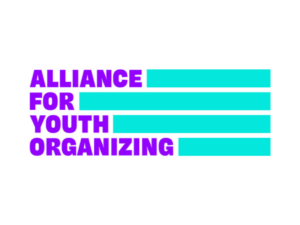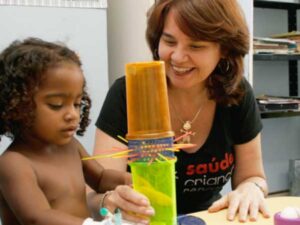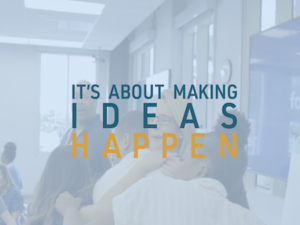New Profit is a national venture philanthropy organization created by and for social entrepreneurs. They use a model to support social entrepreneurs using a combination of venture capital and ecosystem building.
Molly O’Donnell of New Profit spoke with Ashley Hopkinson on December 21, 2023. Click here to read the full conversation with insights highlighted.
Ashley Hopkinson: Can you start by introducing yourself and your organization? What problem is New Profit solving, and how are you solving it?
Molly O’Donnell: Hi, my name’s Molly O’Donnell. I use pronouns, she/her/hers, and I’m a managing partner at New Profit. We’re a national venture philanthropy firm. We support social entrepreneurs in education, economic mobility, and democracy across the United States with unrestricted capital and capacity-building support to build their organization. We just celebrated our 25th anniversary, so New Profit’s been around 25 years.
We were founded by Vanessa Kirsch, who stepped down in 2023 as CEO. Our new CEO is Tulaine Montgomery. Vanessa was a social entrepreneur herself and founded Public Allies. She took a trip around the world with her husband, where she interviewed social entrepreneurs and talked about what barriers they face. When she was in the Mekong River Delta, in Vietnam, she noticed that there was a life-saving nutritional program in one town, but then literally the next town over, that treatment was not there. However, in any town she went to, Coca-Cola was there. So Vanessa wanted to know: Why do for-profit interests scale, whereas life-saving treatments, or interventions, or ideas, are limited in ability to move from one place to another?
She hypothesized that the venture capital and entrepreneurs in the for-profit world have access to two things that nonprofit leaders do not: one is unrestricted capital, or flexible money to be able to make choices, grow their organizations, and build infrastructure; the other is world-class advice. We looked a lot at Greylock Ventures and realized that when folks are working with venture capitalists, there are amazing people who believe in the leaders, who help them think about their problems, and who sit on their boards.
New Profit was built for entrepreneurs, by social entrepreneurs, to solve this problem of how nonprofit organizations can get out of the starvation cycle, hustle the grant money cycle, and build sustainable, transformational change organizations. We do that by unrestricted capital and capacity building.
We do a fair amount around influencing the world of philanthropy, particularly in how they think about giving money, and the types of leaders, interventions, and approaches they [invest in]. We also look at proximate entrepreneurs and systems-change approaches.
Ashley Hopkinson: If I understand correctly, you’re not a one-to-one, direct service per se. Would you say, then, that you’re serving social entrepreneurs, and thereby the organizations that they’ve founded and the work that they’re doing?
Molly O’Donnell: Yes, I would say that has been the core of our work over the full 25 years. I think over time, we will also see the philanthropic community as a big stakeholder around how we are building a multiracial, intergenerational, cross-sector coalition to fuel the evolution of America into a place where all can thrive.
We see philanthropy as having a key role there. Ultimately, we want to transform philanthropy and the service of both social entrepreneurs and the community space. However, they’re a key stakeholder for us, beyond just being the fuel we need to do our work. We raise money as well.
Ashley Hopkinson: How, as an organization, does New Profit measure success and progress? How do you know you’re evolving toward this goal that you have set?
Molly O’Donnell: We have been on a journey, as I think much of the sector has, around measurement. Ten years ago, the things we were looking at were more analogous to the for-profit sector. We were looking at compound annual growth rates, lives touched, direct impact growth, and things like that.
We were also looking at how our organization is measuring, as well. We think about measurement both around how we measure our supportive organizations, and how we measure the success of those organizations. We want to be doing both. While we still look at stuff like CAGRs [compound annual growth rates], we are also trying to think holistically about how organizations think about and measure success, and how we do that ourselves.
When we determine success, we ask: Are our social entrepreneurs growing and developing the capabilities they want to develop? We’re trying to be in deep partnerships. We diagnose by asking, “What is it you all want to do?” Then, over the course of our investment (which is either four years or one year, depending on which of our two investment models they’re using), we ask, “Are you progressing in the ways that you seek to progress?”
We have a growth diagnostic, and the tools we look at help us understand the goals of the organization around capability building. Then, when we look at individual organizational success, we have a mix of quantitative and qualitative [data]. We have a standard template, but each organization gets to choose which measurement they care most about.
We ask for revenue information, expenses, and some of the basic FTE [full-time equivalent] details, to see how they’re evolving. Then we ask, “What measures matter to you most?” and every six months, we ask for them to report on those. We don’t have a standard set of metrics beyond the nutritional data.
This field of developmental evaluation, where folks are mostly evaluating their own learning and evolution toward shifting systems, is really challenging, particularly for systems-change organizations. You’re not going to get direct, easily quantifiable data. It doesn’t work like that.
Ashley Hopkinson: It’s two buckets, how you’re shifting and how the organization’s conception of success also becomes your measure of success. If they’re advancing on the goals they set, you know you’re advancing as well. Is that right?
Molly O’Donnell: Yes, that’s right.
Ashley Hopkinson: Do you have a story that illustrates the impact of New Profit’s work? Maybe a story where you can say, “We made a difference there.”
Molly O’Donnell: When we invest in an organization, we typically serve on the board. A member of our team will spend about 15% to 20% of their time working directly with organizations. There are many stories throughout our history. We talk a lot about being the second call an entrepreneur makes when things hit the fan, second only to someone like their spouse. We have a lot of those stories, but we don’t typically tell those stories, because success is typically when an organization survives a really challenging situation.
This year, I had an organization for whom a funder providing about 40% of their revenue pulled out with two months’ notice. I got that call, [and we helped the organization through.] For that organization, we’re often who they call to say, “I don’t know how to talk to my team. I don’t know how to talk to my board. I don’t know how to move through this.” They’re feeling a level of responsibility, and they’re seeking someone they can trust to talk to about that. We have a lot of stories like that, where we’ve helped an organization through things like a CEO transition.
In this particular moment, in K-12 education philanthropy, we’re seeing a chilling effect in regard to the focus on diversity, equity, and inclusion of the last few years. Philanthropy is shifting, in some ways explicitly, and in other ways implicitly. We provide organizations with support through those shifts.
Then we have lots of organizations with powerful stories, like that of Health Leads. Rebecca Onie moved from a direct impact model to a whole systems change innovation that’s shifting the way the US health system thinks about social determinants of health. And Health Leads still exists as a really powerful organization in the ecosystem. We have lots of those examples.
One thing that I’m really proud of is that five years ago, New Profit did some major research in the field around where philanthropic capital was flowing. We talk a lot about how we want to shift philanthropy, and we see ourselves as an exemplar, hopefully, of what philanthropy could and should be doing. We did this research, and we looked at where philanthropic capital is going, to what leaders.
At the time, 30% of the United States identified as Black and Latinx. We found that only 4% of philanthropy was going to similarly-identified leaders. In our own portfolio, probably about 20% of our money was going to Black and Latinx leaders. We have dramatically transformed our pipeline ways of working. Our portfolio today changes, but we consistently have around 90% leaders of color in our portfolio whereas five years ago, we were around 20%. These are amazing organizations, with amazing leaders. They’ve been in this field, they’ve been doing this work.
We’ve had to look at ourselves and shift our ways of working. In doing so, we have also worked with our philanthropic community, our donor community, to ask, “What mindsets are blocking us from leaving an impact on the table because we think entrepreneurs look a certain way, or have a certain skill set? What are the limitations of current philanthropic mindsets, and where are we not honoring proximity as brilliance and expertise?”
I think a lot of philanthropy has been going through that reflection of what’s limiting impact aspirations as a philanthropic community. I’m proud of the way in which New Profit has done that, and the way we have influenced our donor community to do the same.
Ashley Hopkinson: What insights can be taken from the work that you do that others could learn from? What advice would you give based on your learnings doing this work and being in this space of supporting social entrepreneurs, and also being in the venture capital world and working to make a shift through philanthropy?
Molly O’Donnell: A core insight that fuels a lot of New Profit’s work is the role of relationships and proximity. No matter where you sit in the ecosystem, if you’re a funder or a social entrepreneur, being in close relationships with those who sit in different places, those who look different and think differently than you, unlocks a powerful impact. If we fall too deeply into silos, or think any of us individually holds answers, we’re limiting our potential. The root of the word philanthropy is the love of humans. I think philanthropy has often fallen into this charity frame of thinking, “It’s morally good to give money to those who are lesser than, or who didn’t pull themselves up.” We know that’s all a myth.
I think the only way for philanthropists and entrepreneurs to deeply understand how we all contribute to a thriving future is to build deep relationships. If you have deep and trusting relationships in philanthropy, you give money that’s unrestricted, instead of funding a single idea. You trust entrepreneurs. You believe in their vision, and you get behind that vision. You start to say, “This human has a brilliance, a proximity, and a set of beliefs that I get behind. They are the ones to execute that vision.” It’s not that they sit on this board, or they went to this business school. It’s their vision.
I’ve seen a lot of entrepreneurs stand in their power when they think about fundraising and inviting people into a vision. One of our fundraising trainers often says, “When you go to ask for money, or you go to invite someone into a project, you are going standing up. You’re not going on your knees. You are there to invite someone to do something powerful.” [It’s important to] interrupt this power imbalance that is so prevalent in philanthropy, particularly because a lot of the interventions require a lot of money. Governments are not funding [these initiatives]. There’s this power situation that folks are navigating. How we hold that collectively is critical.
Ashley Hopkinson: Can you describe something that New Profit tried that didn’t work, or that didn’t meet your expectations, and taught you guys an important lesson that other people can learn from?
Molly O’Donnell: New Profit has borrowed from venture capital, and the venture landscape, over time. There are ways that borrowing has served us, and times where we’ve had to question if it continues to serve us over time. In the past, we would invest for four years, and then we would reinvest in many organizations. I think around 80% of our organizations at the time would receive reinvestment, but we had a somewhat rigid perspective on what was required to reach reinvestment. It was a set of compound annual growth rates. You needed to have a capital campaign in place, and it needed to be structured a certain way, things like that.
Our approach was based on pattern recognition regarding what we considered successful at the time. We have come to learn that these ideas are not totally in keeping with the way that we want to be centering social entrepreneurs in their vision. There was tension between this idea of being the wind in entrepreneurs’ sails and honoring their brilliance and proximity and this stance of, “Here’s success. This is the definition of victory.”
We’ve really shifted our language. It is now progress, not victory, and it’s about learning as progress. It’s about entrepreneurs defining their own progress, and us being in a stance of partnership and offering, versus driving to a particular set of outcomes or ideas about what “good” looks like.
We have perspectives on what “good” looks like, but we also aim to recognize our limitations. That has meant we’ve had to shift our measurement structures. We’ve shifted some of our support models, and we’ve certainly shifted some of the ways in which we partner with entrepreneurs. We continue to learn from entrepreneurs about where we get the balance right and wrong. The definition of what we seek to achieve has shifted because of learnings from our entrepreneurs.
Thinking about learning as success is something the sector generally doesn’t value all that explicitly. We want philanthropists to be investing in our learning, and investing in the learning of entrepreneurs. No one has ever seen the equitable, thriving world we all seek to create. We need room for failure for all organizations.
One of the board chairs I work with says, “We’re creating science fiction here because no one’s seen an equitable future. You’re going to have some weird characters, and you’re going to have some chapters that don’t work.” That’s all fine. Let’s normalize and give room for risk and innovation, learn from that, and hold ourselves accountable to that learning.
Ashley Hopkinson: Typically, social innovators face the challenge of raising sufficient funding to keep their work sustainable. For an organization like New Profit, that’s working across so many sectors, what would you say is a challenge for you guys, outside of getting enough unrestricted funding?
Molly O’Donnell: We definitely have funding challenges, but there’s also the challenge of making sure we’re not letting the tail wag the dog, that we’re setting a vision then bringing people into it, versus chasing pockets of money that limit our innovation. Another challenge is figuring out how we think about the boundaries of our work.
We love a broad definition at New Profit. Our issues are education, economic mobility, and democracy, and we think about those quite broadly. Our team values that because we have lots of ideas about what these concepts can mean. It gives us some freedom and flexibility. Entrepreneurs tend to like that because they can find their way to us. It also makes it quite challenging for us to make choices sometimes, as we have to decide, “Does this person really fit?” Or “Would we really consider this democracy?”
We wrestle with how to define boundaries, where to define boundaries, and who gets to inform those boundaries. How do we engage the relationships we have with social entrepreneurs to help inform where boundaries lie? Instead of sitting by ourselves in a conference room and saying, “This is what I believe democracy work is,” we want to be informed by those who are leading in the sector. Where we define our work, how that work gets defined, and by whom, is something we continue to grapple with.
Ashley Hopkinson: I wonder if the large number of organizations you work with contributes to that challenge. Earlier, you said that you guys are the second phone call. How many organizations are you that second phone call for? Is deep work a part of it? How much does New Profit have to scale in order to do the kind of work that guys want to do?
Molly O’Donnell: Yes, that’s a big part. The bulk of our work has been what we call our build portfolio, which includes this four-year, deep engagement model and the board seat. A couple of years ago, particularly after we did that research around where capital was flowing, we created what’s called our catalyzed model, which is a one-year, cohort-based $100,000 program meant to help organizations jump the capital chasm and get to multi-level funding so they can get ready for build-level investing from us, and from the field generally.
We’ve been excited by that catalyzed work, and we’ve seen most funders want to go there. You get eight organizations to support instead of one, but it’s the same price as one build investment. One of the things we’ve wrestled with is how much we want to do that versus our deeper work. We want the sector to go toward more multi-year, unrestricted funding and want to represent that in our funding choices, but we sometimes get pulled into different places.
Ashley Hopkinson: How do you see New Profit advancing toward systems-level change in the field? How, specifically, do you feel like you guys are doing that? Is it partnerships, or leveraging technology, or a combination of things?
Molly O’Donnell: Systems change is core to how New Profit sees our work, and within New Profit, we think about systems change in a few different ways. One, we’re oriented to a multiracial, intergenerational, cross-sector coalition. Adrienne Maree Brown talks about fractals, so we ask both how New Profit itself is doing systems-change work and how we are supporting our organizations in their own systems-change evolution.
Two is through our investment selection. We’re always looking for organizations that have aspirations for systems change. Our full portfolio represents lots of different approaches to our pathways to systemic transformation. We’re assessing that, and then we’re supporting organizations in developing their own systems-change strategies.
We also have a policy arm that’s trying to focus on transformation within the United States around [funding.] Philanthropy pales in comparison to the number of dollars that move through the US federal government. It’s just a tiny sliver relative to the way that federal capital is spent. How do we ensure that the insights of all of our amazing entrepreneurs directly inform the way that federal policy is written, the way that federal money flows, to whom, and how, and how it reflects the brilliance of our proximate social systems-change entrepreneurs? Our policy arm is a big part of that, as well as our donor community. How are we helping our donor community think differently about multi-year unrestricted capital and investing in systems change? How are we helping them get out of the counting schools, or counting beans, mindset and think differently about impact?
We want to see all of that coming together and to see policymakers, philanthropists, social entrepreneurs, and young people in the communities that our entrepreneurs serve convene and be in collaboration and community together. We want them to recognize their connectedness and interdependence, and inform the way one another moves in the social change landscape. I’d say that’s how we think about it. We certainly think about it with each of our entrepreneurs around how they structure their strategies.
Ashley Hopkinson: What would you say you think is most needed from other partners to achieve systems change in this field? Of course, New Profit can’t do it alone. Other people have to contribute to making a difference. What feels like it’s missing, or where is there a gap? What would you like to see other people show up doing?
Molly O’Donnell: Systems-change work is so emergent. It requires a focus on learning, and it requires capacity. In terms of organizations and philanthropists, it’s giving flexible money to organizations, creating space for organizations to think about how they want to advance systems change, and then shifting. Asking questions like: How are you thinking about measurement with grantees?
I just met with a number of organizations in New York, and we did this activity on theory of change, where people have really big visions, and then they map activities to their vision, kind of like a logic model. People had these insights around their vision being to transform the system, but all their time going to their direct impact model and people management.
It’s so important for your teams to reflect on how they spend their time, and to ensure they can secure partnerships with funders that allow them spaciousness in their work. You can’t let inertia keep you driving in certain ways, yet there are so many forces leading you in the same direction. Sometimes I find myself saying, “I think we accomplished a lot, but did we accomplish the things we really needed to accomplish?” Leaders need space and relationships to connect, and philanthropists need to help folks get that space.
Ashley Hopkinson: I realize there are other players at New Profit, but how do you, Molly, see your work evolving over the next five years? What would you like to see transform and move with New Profit?
Molly O’Donnell: We’ve grown a lot in our portfolio, particularly in our build and catalyze portfolios, and then in issue areas. For instance, democracy is a newer area. Yordanos Eyoel, from Keseb, founded our democracy work and then went on to found Keseb. I’m excited for New Profit to continue putting resources into the democracy landscape. It feels critical to be investing in democracy for the long game. We’re not ever going to be doing enough to be really moving on election cycles, or moving flexibly, but I’m excited for New Profit to bring the systems-change lens to this work, to focus on the role of proximity, and to think about what’s possible for the future of our democracy. We can paint a really positive vision of what that could be as we continue to build our investment portfolio there.
We’ve grown. We’ve made something like 300 or 350 investments over our life cycle. The last few years have seen huge growth, but we’re not figuring out how to leverage that network. We’re doing it in some places, but we need to figure out how to help entrepreneurs connect with one another across different stages, and how to bring together education, economic ability, and democracy. Sometimes they’re connected, and we’re bringing them together annually, but we need to ask what else we can do to build networks for the future. That feels like a really exciting place for us to go.
Then I think to just continue pushing on philanthropy and to be bold. This moment calls for being bold. I’m worried about this moment in philanthropy, and particularly what the 2024 US election will do around where people are placing capital. I think it calls New Profit to continue making bold investments, and for us to be very clear about our rationale.
Ashley Hopkinson: What do you think makes New Profit distinctive? There are so many things that come to mind when we’re talking about systems change and how you support social entrepreneurs, but in the sea of all these organizations, what would you say is the one thing that makes you guys most distinctive in this space?
Molly O’Donnell: I’d say probably two things. One is our commitment to relationships and our commitment to learning, which I think have probably come through in our conversation, as we’ve talked about our commitment to systems change and proximity.
Those have all come out of being in deep relationships and focusing on learning from our amazing entrepreneurs. We have a willingness to keep moving, keep evolving, and not be static. Frankly, it can be tough internally, because people will say, “It’s changing everything.”
Ashley Hopkinson: Change is what we do.
Molly O’Donnell: We always say, “It’s for entrepreneurs, by entrepreneurs. We’re always innovating.” People often ask, “Is there anything steady?” Maybe not, and I think that’s a real advantage for us. It allows us to continue to serve our entrepreneurs and to share with them what we’re learning across this amazing network.
Ashley Hopkinson: That’s wonderful. Thank you for talking with me today.
Click here to read the full conversation with insights highlighted.
Ashley Hopkinson is an award-winning journalist, newsroom entrepreneur and leader dedicated to excellent storytelling and mission-driven media. She currently manages the Solutions Insights Lab, an initiative of the Solutions Journalism Network. She is based in New Orleans, Louisiana.
* This interview has been edited and condensed.
Learn about other organizations that provide innovations in social entrepreneurship.







